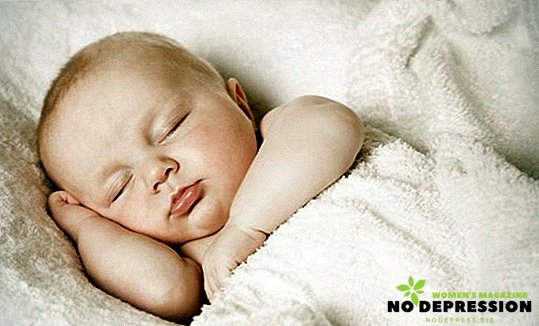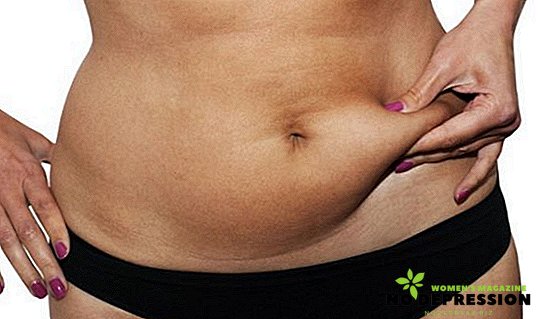Sleep is an integral part of human life. Of particular importance is the state of rest in the process of infant development. The state of both the baby and his parents depends on a restful and sound sleep.
After the first 4 weeks in the life of the baby, certain changes are observed in the sleep and wakefulness of the newborn. Parents during this period need to pay special attention to providing conditions for a comfortable sleep for babies.

Features of sleep at the age of two months
For each age of children is characterized by a different sleep pattern. Daytime baby up to 3 months is almost the same. It consists of - feeding, wakefulness, sleep. The only difference is in the duration of sleep. In books on motherhood, you can find an approximate schedule of the mode of the day and sleep of a newborn. But each child is individual and the conditions in which he is brought up are different. Most often, the baby sets the time for feeding, wakefulness and sleep, and the mother can only adapt to this schedule.
For a restful and sound sleep baby should:
- adequate food;
- cozy atmosphere;
- contact with the mother;
- love and attention from parents.
If the child is overworked it is harder to put to bed.
 Signs of fatigue:
Signs of fatigue:
- with a calm emotional state, the baby goes to sleep within 10-20 minutes, when overexcited, this process takes a longer time;
- at night often wakes up, cries, behaves restlessly;
- involuntary jerking of the hands and feet at the moment of sleep is observed;
- in the whole day it is often capricious for no reason;
- often rub eyes, while looking sluggish.
Night sleep of a child in 2 months
By the age of two months, the baby's sleep mode is almost debugged. But all the little ones are different and may want to sleep at different times. On average, nighttime sleep for babies lasts from 7 to 11 hours. The countdown of the duration of rest at night begins from the time of the last feeding.
The baby at this age still needs nightly feedings. It is very important to teach your child to fall asleep during this period after he eats. At this age there is a risk that the baby will change places day and night. Some children, awake at night, sleep in the daytime.
Now young mothers practice nighttime sleep separately from the baby. Although the experience of many mothers suggests that the baby sleeps much stronger and calmer when he feels the presence of the mother next. If the baby is breastfed, sleeping together allows the mother to sleep when she does not have to get up to feed the baby.
For a good night's sleep, you need:
- going to sleep should occur every day at one time;
- make baths of soothing medicinal herbs;
- when awakening to feeding ensure silence, do not play with the baby;
- Do not refuse, if the baby falls asleep only with the mother's breast.
Daytime sleep
 Monthly pipsqueak sleeps often during the day, but his sleep is short and tender. By two months, the number of hours of wakefulness increases, but the sleep is longer. So, the daytime rest is divided into three daytime sleep, the duration of each of them, on average, is from one and a half to 2 hours. The wakefulness period should not exceed 2-2.5 hours. At this age, the crumbs can have two long sleep and some short.
Monthly pipsqueak sleeps often during the day, but his sleep is short and tender. By two months, the number of hours of wakefulness increases, but the sleep is longer. So, the daytime rest is divided into three daytime sleep, the duration of each of them, on average, is from one and a half to 2 hours. The wakefulness period should not exceed 2-2.5 hours. At this age, the crumbs can have two long sleep and some short.
Again, these figures are approximate. If the baby feels good, does not naughty and at the same time sleeps no more than an hour, but several times a day - this is also an indicator of the norm. It all depends on the well-being of the crumbs.
Too active kids are known to sleep a little less, and quiet on the contrary for a couple of hours longer. The duration of rest is also influenced by bloating, cramps, which torment many babies. Massage and medication may help.
Important! If the baby doesn’t have enough rest in the afternoon, at the same time she is naughty, eats poorly, shows no interest in anything, you should reconsider his regime.
How much should a two-month-old infant sleep

In aggregate, the baby during the day should be at rest from 15 to 19 hours. Most of this time is at night. Many parents note that the baby, compared with the first month, has become much less sleep. This is an absolutely normal process. Baby grows, there is interest in everything around. Parents still have to watch out and avoid overwork, lack of sleep. After all, his behavior depends on it.
How to wean a baby from motion sickness
One of the ways to quickly calm the baby is by rocking. So the child makes up for the lack of mother's warmth and calms down faster. But this method has its drawbacks. First, the baby gets used to the motion sickness and refuses to sleep without her mother's hands. Secondly, the crumb grows and over time it is difficult for the mother to swing him in her arms. It is not surprising that parents eventually begin to look for ways to wean the little one from rocking on their hands.
 Before the beginning of uncoupling, you need to be prepared for the fact that this process will certainly be accompanied by children's tears. The baby does not want to so easily give up mother's cozy hugs. The best option from birth is not to teach the baby to motion sickness. To make exceptions only at the time of acute need.
Before the beginning of uncoupling, you need to be prepared for the fact that this process will certainly be accompanied by children's tears. The baby does not want to so easily give up mother's cozy hugs. The best option from birth is not to teach the baby to motion sickness. To make exceptions only at the time of acute need.
Another way is to replace the process of motion sickness with another method, for example, by putting a baby in a crib:
- hold the hand or stroke the hair;
- sing a lullaby, read a children's fairy tale;
- do light massage;
- use a swinging bed, a cradle;
- put in the crib favorite toy.
Today you can find electric rocking chairs, cribs with a built-in pendulum. You can also use handy methods available, for example, set the pram in a prone position and rock it, or simply put the baby on a large pillow. However, experts believe that completely abandon the motion sickness is not worth it.
It is scientifically proven that:
- physical contact between mother and baby is necessary to establish a close relationship between them;
- thanks to the swing on the hands, the baby will more easily tolerate the pain associated with cramps and teething;
- motion sickness is associated with a baby with the time when he was still in the womb, he relaxes faster and falls asleep more easily;
- there is also an assumption that children deprived of bodily contact become more closed over time, indecisive, and as a result, the lack of maternal embrace can result in serious deviations in the future.
Conclusions and tips for good sleep
At 2 months, the baby still continues to form a certain mode of rest and wakefulness, he can sleep both longer than the time specified in the statistics, or less. Under normal state of health is a variant of the individual norm. However, the absence of a certain schedule significantly complicates the life of parents. Therefore, fathers and mothers can independently contribute to a good sleep of the child, and for this it is necessary to adhere to the following recommendations:
 The baby's sleep during this period is very sensitive, plus the ear is aggravated, therefore one should protect it from any external noise.
The baby's sleep during this period is very sensitive, plus the ear is aggravated, therefore one should protect it from any external noise.- Pajamas should be without inner seams and made of soft fabric covering all parts of the body so that the baby, if the blanket slides, is not cold.
- Shortly before bedtime you can ventilate the room by letting in fresh air.
- Children sleep stronger after a warm bath. The bathing process should not last more than 15 minutes, as some children after long water procedures, on the contrary, are in an excited state.
- Feed should be 2-3 hours before retirement.
- Do not overwork.
- Daily walks, swimming, sleep - should occur at the same time.
- Babies sleep better in the fresh air, so long walks on the street will only benefit.
Adhere to wakefulness and rest is extremely important for the normal development of the crumbs. However, it is not necessary to force the child to adjust it to the established standards of sleep. After watching the crumbs, you can make your individual schedule.


 The baby's sleep during this period is very sensitive, plus the ear is aggravated, therefore one should protect it from any external noise.
The baby's sleep during this period is very sensitive, plus the ear is aggravated, therefore one should protect it from any external noise.









